#i also finally found the first Splatoon game! now I have all three and technically could start playing them now!
Explore tagged Tumblr posts
Text
I haven't checked out the retro game store this month yet so I thought it's time to do it today.
Did find a good bunch of games!
#dragon's stupid thoughts#biggest win here is probably the original mario rpg for the snes! with manual. and a flyer that's apparently worth 40 bucks#i also finally found the first Splatoon game! now I have all three and technically could start playing them now!#if I had motivation for anything...#anyway.#i also found m&l paperjam bros! i love to find more m&l games cuz they are so much fun and wholesome!#other finds are: wario woods. kirbys dream course. princess Peach ds. pkmn dash.#was a bit expensive all together but well. when else am I gonna have the chance again. right? ha... goodbye moneyyyy
0 notes
Text
Salmon Run and Presentation
A (not so) brief dissertation on narrative framing in video games, featuring Splatoon 2
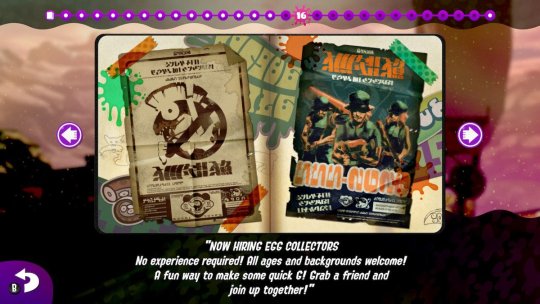
With the holidays in full swing, I took advantage of a deal one day when I went into town, and finally got my hands on Splatoon 2. Having loved the prior game as much as I did, waiting this long to get the sequel felt almost wrong. But like many another fellow meandering corpus of conscious flesh, I am made neither of time nor money.
Finally diving in, I figured I might take this excuse to remember that I write game reviews, sometimes. You know, when the tide is high, the moon blue, and the writer slightly less depressed. I ended up scrapping my first couple drafts, however. You see, a funny thing was happening; I kept veering back into talking about Salmon Run, the new optional game mode the sequel introduces.
Also I might look at the Octo Expansion later, on its own. After I get around to it…
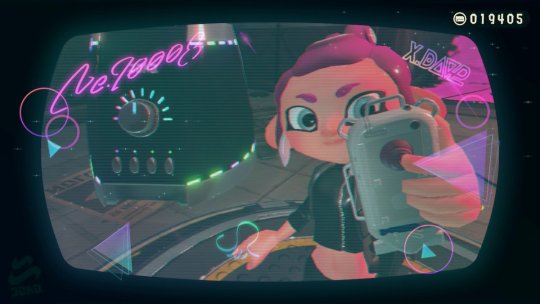
Look, the base game already has a lot of content to explore, and as previously stated, I am sadly corporeal, and not strung together with the metaphysical concept of time itself.
My overall thoughts, however, proved brief, so I’ll try to keep this short.
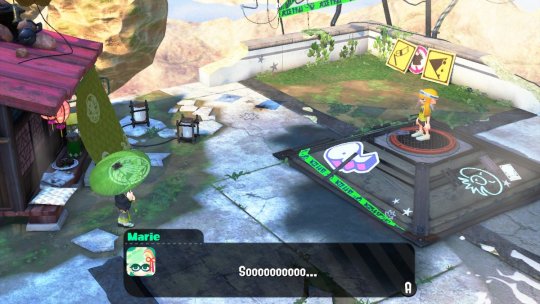
(Mild spoilers coming along.)
Gameplay wise, I think the story mode is much improved upon by handing you different weapons for certain levels which were specifically built with them in mind. Whereas the prior game left you stuck with a variant of the starter splattershot all the way through. This keeps things interesting, pushes me outside of my comfort zone, and it’s a good way to make sure players will come from a well-informed place when deciding what weapon they want for multiplayer; which, let’s face it, is the real meat of these games and where most players are going to log the most time.
I also love the way bosses are introduced with the heavy drums and rhythmic chants and the dramatic light show. It endows the moment with a fantastic sense of gravitas, and manages to hype me up every time. Then the boss will have an aspect of their design which feels a bit silly or some how rather off, keeping the overall tone heavily grounded in the toony aesthetics the series already established for itself.
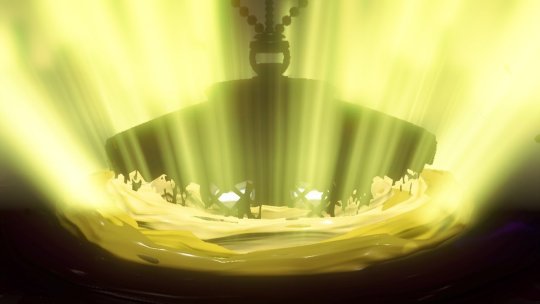
Narratively, I felt rather okay about the story aspect of Story Mode. The collectible pages in the levels still have a certain amount of world building, though this time it seems more skewed toward explaining what pop culture looks like in this world, such as, an allusion to this world’s equivalent to Instagram.
Cynical as it is…
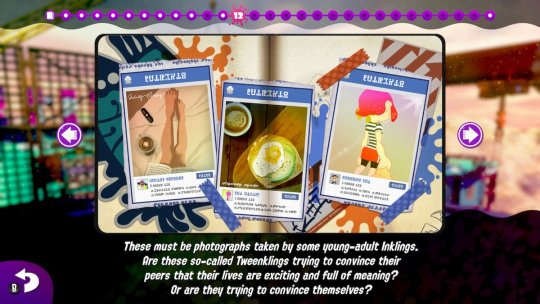
That’s definitely still interesting in its own right, though perhaps it’s less of a revelatory gut-punch as slowly piecing it together that the game takes place in the post-apocalypse of Earth itself, and the inklings copied ancient human culture.
We still got some backstory for this game’s idol duo, though. And that, I appreciate. It means Pearl and Marina still feel like a part of this world, rather than seeming obligatory for the sake of familiarity, given the first game had an idol duo as well.
Meanwhile, perhaps it is a bit obvious that Marie’s cousin, Callie, has gone rogue, and that she is the mysterious entity cracking into the radio transmissions between her and Agent 4. If I recall correctly, that was a working theory that came about with the first trailer or two. That, or she had died.
As soon as Marie says aloud she wonders where Callie has gone, I knew right away. And that’s just in the introduction.
That said, on some level, after stomaching through certain other games and such that actively lie or withhold information to force an arbitrary plot twist for plot twist sake, it feels almost nice to go back to a narrative that actually bothers to foreshadow these things. Plus, having gotten already invested in Callie as a character from the first game, I still felt motivated to see the story through to find out why she went rogue. And, loving the Squid Sisters already, there was a hope in me that she could be redeemed, or at least understood. In terms of building off the prior game’s story, Splatoon 2 is moderately decent.
Also, I mean, c’mon. The big narrative drive might be a tad predictable, but hey, this game is for kids. It’s fine.
That, I think, is something I love the most about Splatoon. Despite feeling like you’re playing in a Saturday morning cartoon, and being aimed primarily at children, it doesn’t shy away from fairly heavy subjects. Such as the aforementioned fact that the humans are all long dead and you’re basically playing paintball in the ruins of their consumerist culture.
Which brings me to what fascinates me so much about Splatoon 2: the way in which Salmon Run is framed.
You see, on the surface, Salmon Run appears to be your typical horde mode; a cooperative team (typically comprised of randoms) fights off gaggles of foes as they take turns approaching their base in waves. Pretty standard for online shooters these days, as was modernly popularized by Gears of War 2, and Halo ODST.
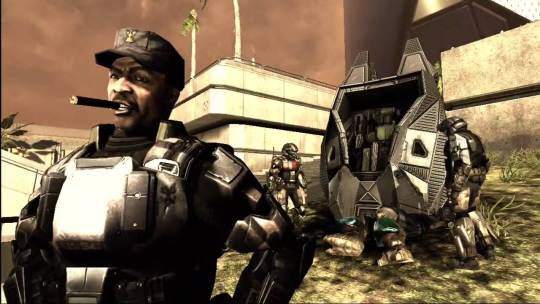
I say “modernly,” as the notion of fighting enemies as they approach in waves is not exactly a new concept for mechanical goals within video games. Rather, the term itself, as applied to multiplayer shooters, “horde mode,” became a point of game discussion when Gears of War 2 introduced the new game mode by that same name back in… 2008?
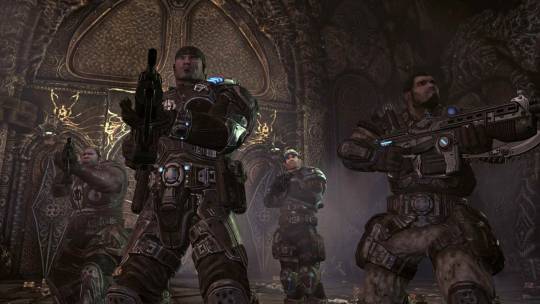
No, no that can’t be right. I played Gears 2 back in high school (I had worse taste back then, okay?). Which, from my perspective, was basically yesterday. That game being ten years old would mean I myself am old now, and that just can’t be. I’m hip. I’m young.
I am, to stay on theme here, fresh.
But okay, existential crises and game talk terms aside, the writing team behind Splatoon 2 probably decided to absolutely flex when it came to the narrative surrounding Salmon Run. It is one of the most gleaming examples of the nontraditional things you can do with writing in video games, to really elevate the experience.
Let me explain.
You see, narrative in video games typically falls into one of two categories: either the story sits comfortably inside of the game, utilizing it like a vehicle to arrive at the destination that is its audience’s waiting eyes and ears. Or the narrative, on some level, exists rather nebulously, primarily to provide something resembling context for why the pixels look the way they do, and why the goals are what they are.
Not to say this is a binary state of existence for game writing; narrative will of course always provide context for characters, should there be any. It’s primarily older, or retro games that give you a pamphlet or brief intro with little in the way of worrying over character motivation, and the deeper philosophical implications of the plot, etc (though not for lack of trying). These would be your classic Mario Bros. and what have you, where the actual game part of the video game is nearly all there is to explore in the overall experience.
Then you have games like Hotline Miami that purposely sets up shop right in the middle to make a meta commentary about the state of game narrative, using the ideological endpoint of violent 80’s era action and revenge-fantasy genre film as inspiration and the starting point to draw comparison between the two. It’s bizarre, and I could drone on about this topic.
But I digress.
Despite falling into that latter category, that is to say having mainly just an introduction to the narrative context so you can get on with playing the game, Salmon Run is a stellar example of how you can make every bit of that context count (even if it does require the added context of the rest of the game, sort of, which I’ll explain, trust me).
First, a (very) brief explanation of how the game itself works, for the maybe three of you who haven’t played it yet.
A team of up to four inklings (and/or octolings) have a small island out in open waters. Salmonid enemies storm the beaches from various angles in waves. Each wave also comes with (at least) one of eight unique boss variants, who all drop three golden eggs upon defeat. Players are tasked with gathering a number of said golden eggs each round, for three rounds, after which their failure or success in doing so shows slow or fast progress towards in-game rewards.
And it’s all an allegory for the poor treatment of labor/workers, utilizing the fishing industry as both an example and a thematically appropriate analogue. Yes, I’m serious.
First, Salmon Run is not available through the main doors like the other multiplayer modes. Rather, it is off to the side, down a dingy looking alley. And when you’re shown its location, either because you finally entered the Inkopolis plaza for the first time, or because the mode has entered rotation again, Marina very expressly describes it as a job.
A job you should only do if you are absolutely, desperately hard strapped for cash. You know, the sort of job you turn to if, for one reason or another, you can’t find a better one.
An aside: technically, playing Salmon Run does not automatically net you in-game currency, with which to buy things, as regular multiplayer modes do. Rather, your “pay” is a gauge you fill by playing, which comes with reward drops at certain thresholds; some randomized gacha style capsules, and one specific piece of gear which gets advertised, to incentivize playing.
The capsules themselves drop actual paychecks in the form of aforementioned currency, or meal tickets to get temporary buffs that help you progress in the multiplayer faster via one way or another. Which, hey, you know, that helps you earn more money also. Working to get “paid,” so you can get things you want, though, still works perfectly for the metaphor it creates.
When I first saw it open up for rotation, I found out you had to be at least a level four to participate. Pretty par for the course, considering it’s the same deal with the gear shops. But, again, it’s all in the presentation; Mr. Grizz does not simply say something akin to the usual “you must be this tall to ride.” He says he cannot hire inexperienced inklings such as yourself, because it’s a legal liability.
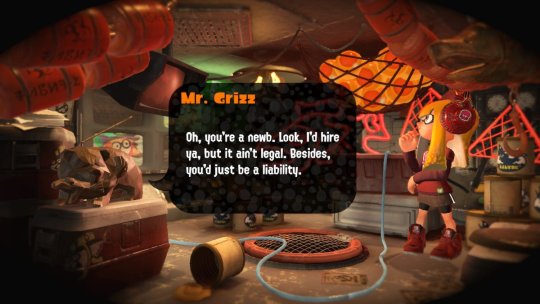
After returning with three extra levels, I was handed off to basic, on-the-job training. Which is only offered after Mr. Grizz (not ever physically present, mind you, but communicating with you via radio), the head of Grizzco, uses fairly typical hard sell rhetoric when it comes to dangerous, or otherwise undesirable work: calls you kid, talks about shaping the future and making the world a better place, refers to new hires as “fresh young talent,” says you’ll be “a part of something bigger than yourself.” You know, the usual balancing act of flattery, with just the right amount of belittlement.
Whoa, hang on, sorry; just had a bad case of deja vu from when the recruiter that worked with the ROTC back in high school tried to get me to enlist… several times… Guess he saw the hippie glasses and long hair and figured I'd be a gratifying challenge.
The fisher imagery really kicks in when you play. Which, I figure a dev team working out of Japan might have a pretty decent frame of reference for that. A boat whisks you out to sea with your team, and everyone’s given a matching uniform involving a bright orange jumper, and rubber boots and gloves. If you've ever seen the viral video of the fisherman up to his waist in water telling you not to give up, you have a rough idea. Oh, and don't forget your official Grizzco trademark hats.
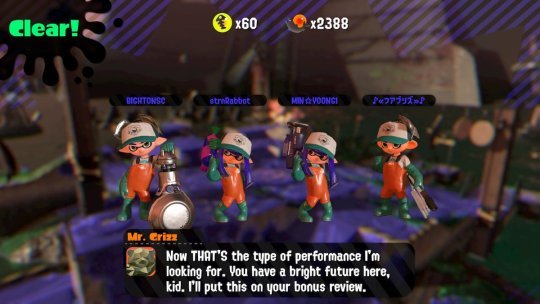
It’s on the job itself where a lot of what I'm talking about comes up the most; that is to say, despite buttering you up initially, Mr. Grizz shows his true colors pretty quickly. While playing, he seems to only be concerned with egg collecting, even when his employees are actively hurting. This is established and compounded by his dialogue prior to the intermediate training level, in which informs you about the various boss fish.
Before you can do anything remotely risky, even boss salmonid training, Mr. Grizz tells you he has to go over this 338 page workplace health and safety manual with you. But, oops, the new hire boat sounds the horn as you flip to page 1, so he sends you off unprepared. “Let’s just say you’ve read it,” he tells you, insisting that learning by doing is best.
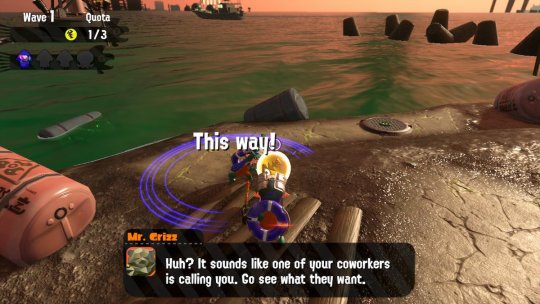
This flagrant disregard employee safety, in the name of met quotas; the fact we never see Mr. Grizz face to face, making him this vague presence that presides over you, evaluating your stressed performance with condescension; that we are not simply given the rewards as we pass thresholds to earn them, having to instead speak with another, unknown npc for our pay… It all drives toward the point so well.
The icing on the cake for me is when a match ends. You, the player, are not asked if you’d like to go back into matchmaking for another fun round of playtime. Rather, you are asked if you would like to “work another shift.”
The pieces all fit so well together. I shouldn’t be surprised that, once a theme is chosen, Splatoon can stick to it like my hand to rubber cement that one time. It has already proven it can do that much for sure. But it’s just so… funny? It’s bitterly, cynically hilarious.
Bless the individual(s) who sat in front of their keyboard, staring at the early script drafts, and asked aloud if they were really about to turn Mr. Grizz into a projection of all the worst aspects of the awful bosses they’ve had to deal with in life. The answer to that question being “yes” has led to some of my favorite writing in a video game.
All of these thoughts, as they started forming in my skull, really began to bubble when I noticed Salmon Run shifts become available during my first Splatfest.
Splatfest is, to try and put it in realistic terms, basically a huge, celebratory sporting event. Participation nets you a free commemorative t-shirt and access to a pumping concert featuring some of the hottest artists currently gracing the Inkopolis charts.
The idea, the notion, that a hip young inkling (or octoling) might miss out on one of the biggest parties of the year because they need money more than they need fun? It’s downright depressing.
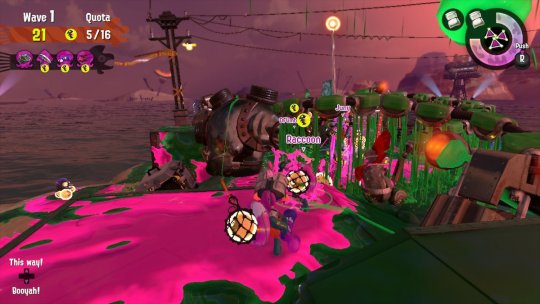
It got me thinking. I looked at my fellow egg collectors. In-universe, we were a bunch of teen-to-young-adult aged denizens missing out on all the fun because we desperately needed the cash. We became stressed together, overworked together, yelled at by our boss together. But in those sweetest victories, where we’d far surpassed our quota? We celebrated together.
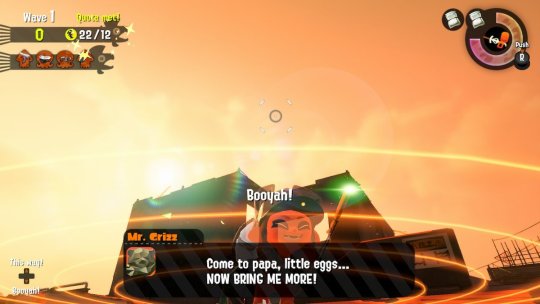
Spam-crouching, and mashing the taunt, something changed. I felt a greater sense of comradery with these squids and octos than I did in nearly any other coop game. And it’s all thanks to the rhetorical framing of the game mode.
It accomplishes so many things. It’s world building which wholistically immerses you in the setting. But mainly, its dedication to highly specific word choice does exactly what I mentioned earlier: it elevates the experience to one I could really sit down and think about, rather than use to while away the hours, then move on to something else. So many games make horde modes that feel inconsequential like that; it’s just for fun.
There’s nothing wrong with fun being the only mission statement for a game, or an optional mode of play. But this is exactly what I mean when I say this is the nontraditional writing games can do so much more with. And Splatoon 2 saw that opportunity, and took it. And what a fantastic example of bittersweet, cold reality, in this, a bright, colorful game meant mainly for children…
Happy Holidays, everyone!
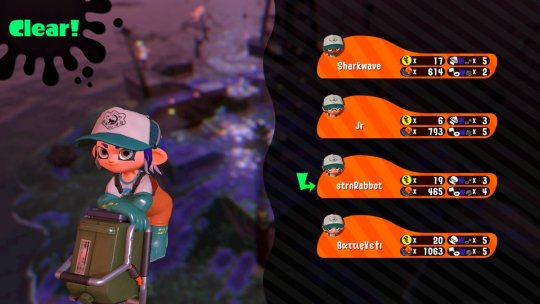
21 notes
·
View notes